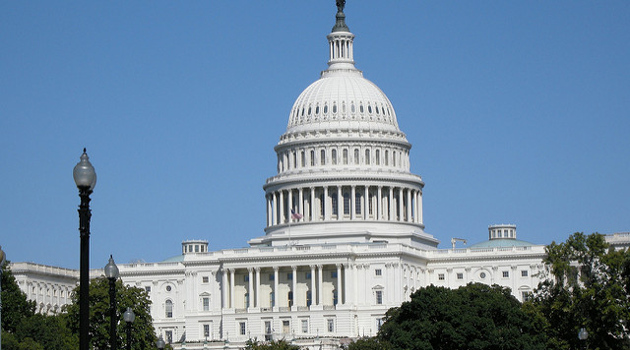On Friday, House Democrats voted along party lines to pass H.R. 1, a sweeping election reform bill called the “For the People Act.” But instead of improving the electoral system as they claim, it unconstitutionally undermines key democratic institutions.
H.R. 1 is a large and complex piece of legislation with many troubling provisions. Among other things, it usurps the power of state and local governments by federalizing elections and imposing one-size-fits-all regulations, turns the FEC into a partisan agency, and erodes political speech and association rights.
Ilya Shapiro & Nathan Harvey explain how H.R. 1 opens the FEC up to political abuse:
After Watergate, Congress created the FEC as a six-member, politically independent body so that neither party could use its regulatory power to punish political opponents. H.R. 1 abandons this longstanding structure, refashioning the FEC into a five-member commission that allows a simple majority to investigate and prosecute. The bill does state that no more than two members can be from the same political party, but this wouldn’t stop obvious partisans like, say, Bernie Sanders (who’s technically an “independent”) from being appointed. Adopting these changes would subject the FEC — our election monitor — to partisan control.
The bill also not only federalizes many election rules and prevents states from setting their own voting qualification rules, but it puts federal employees, themselves a special interest group, to work as poll workers. Nor is that the only provision that opens up the possibility of political intimidation.
H.R. 1 requires sharing of the private information of certain donors with the government. While discussing the similar issue of Schedule B donor reporting requirements, I explained why such a demand is problematic:
A healthy democracy needs its citizens capable and willing to express their political preferences even, or especially, when they conflict with the views of those in power. Tellingly, robust protections for speech were listed first among the Bill of Rights and have long been a cornerstone of our republic. Supporting like-minded organizations working to inform and shape the public debate has proven to be a valuable means by which millions of Americans express their political preferences. Unfortunately, invasive donor reporting requirements instituted by the Internal Revenue Service threaten to chill this critical democratic tool.
…Like the secret ballot, respecting donor privacy and thus anonymous speech and association is essential to prevent majoritarian abuse and intimidation that subverts democracy. This was a lesson learned in the civil rights era after the shameful attacks on the NAACP and its supporters.
Although officials pledge to keep the collected information confidential, there’s good reason to question the ability of the government to protect sensitive taxpayer information given the history of inadvertent disclosures and information leaks at the IRS. For example, an IRS official wrongly included the Schedule B donor information provided by the National Organization for Marriage in response to an individual’s request for its Form 990. The information was subsequently shared with an adversarial organization that then made it public.
…Similarly, as part of the investigation into the targeting of conservative organizations by the IRS, Lois Lerner was found to have illegally shared confidential Form 990 taxpayer information with the Federal Election Commission. The classified information disclosed by Edward Snowden further demonstrated that data collected by one government agency is vulnerable to illegal access and exploitation by any other.
For minority viewpoints, public exposure can lead to intimidation or other private consequences. We saw this when Brendan Eich was forced out as Mozilla CEO after it was revealed he donated in support of California Prop 8.
Not long after that, an effort by then-California Attorney General Kamala Harris to collect donor information was found to be unconstitutional as applied to the Americans for Prosperity Foundation and the Thomas More Law Center, though a similar challenge by the Center for Competitive Politics failed. In ruling on the Thomas More Law Center challenge, the district court found that “in the context of a proven and substantial history of inadvertent disclosures,” the state’s government could not assure donor confidentiality.
The ACLU, otherwise supportive of most of the bill’s leftwing objectives, finds problems:
The upshot of the DISCLOSE Act, and the essence of why we oppose it, is that it would chill the speech of issue advocacy groups and non-profits such as the ACLU, Planned Parenthood, or the NRA that is essential to our public discourse and protected by the First Amendment. These groups need the freedom to name candidates when discussing issues like abortion, health care, criminal justice reform, tax reform, and immigration and to urge candidates to take positions on those issues or criticize them for failing to do so. The DISCLOSE Act interferes with that ability by impinging on the privacy of donors to these groups, forcing the groups to make a choice: their speech or their donors. Whichever they choose, the First Amendment loses.
Far from enhancing democracy, exposing private information of those who donate to nonprofit organizations as an exercise of political speech undermines core democratic values. Individuals should not have to worry that a rogue employee might share their info with political enemies, who in turn might engage in various forms of intimidation and harassment. There’s a reason the secret ballot is considered fundamental to free and fair elections.
Thankfully, Mitch McConnell shows no interest in taking up H.R. 1 in the Senate. However, Democrats have made clear that they are playing the long game and consider the recent vote as laying the groundwork should they later flip the Senate and White House. The preservation of liberty, as always, thus requires constant vigilance.
———
Image credit: Shaw Girl | CC BY-NC-ND 2.0.

